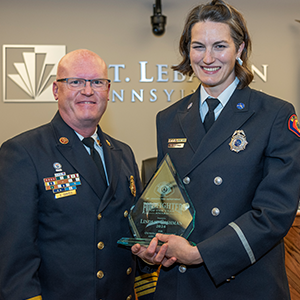storm preparedness

Sometimes it starts as an aura. Did the lights just flicker or did I imagine it? I imagined it, you think, and resume what you were doing. Then: Click! The power is out. Now what? You wonder if it’s just your house. You look outside but can’t tell since it’s still light. You text your neighbor.
“You guys have power over there?”
Nope.
And in that moment, as you are flipping through the kitchen junk drawer for the mini-Maglite, you wish you had been better prepared.
This is your warning. In winter, it happens: power outages, ice storms, epic snowfalls. So, we asked the fire department how to plan for it. This is what they told us:

First of all, ask a fifth grader! All fifth-grade students in Mt. Lebanon receive weather preparedness training as part of the fire safety curriculum. Firefighters visit the kids in the schools, get them interested and then drop the knowledge on them. They love it.
Next, make a list for your next trip to Rollier’s. Here are some things you definitely should have on hand:
• A working carbon monoxide detector in or near your bedroom, and one on each level of the house.
• Lots of flashlights. The fire department would really prefer you not use candles.
• Working smoke detectors in each bedroom and on each floor, especially near the kitchen and all heat sources.
• If you have a space heater, make sure it is UL listed and do not plug it into an extension cord or power strip.
• Extra batteries of all types, especially portable cellphone chargers and extra batteries for your computer modem if it runs your landline phone (Internal batteries usually last a max of eight hours if you lose power).
• Three days worth of food, water and medication, just in case.
• For your car: snow brush, ice scraper, blankets, jumper cables, snacks, sand/kitty litter for traction, good tires, a new battery and a full tank of gas.
Things to avoid:
• Never use a kerosene heater inside.
• Never use a generator inside. If you’re worried about your generator being stolen, chain and lock it to something sturdy outside.
• Don’t shovel snow if you’re not healthy. Snow is heavy, and shoveling is physically taxing.
• Don’t drive during an ice storm. Snow tires and four-wheel-drive will not stop your car, but the telephone pole will. And guess what is a top reason for power outages? (If you said vehicles into poles, bonus points to you.)

Other tips:
• If temps fall below 40 degrees, consider shutting off your outside water and opening all faucets to drain water and avoid broken pipes
• Check on elderly neighbors or neighbors with disabilities.
• Clear neighborhood fire hydrants three feet in all directions after a
heavy snow.
Most important, call 9-1-1 if you find yourself in an emergency.





